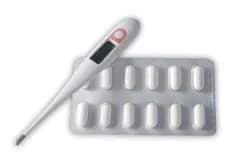
It’s cold and flu season, and, even with the availability of shots, hand sanitizer, over-the-counter preventatives and prescription remedies, many people are likely to catch a cold or influenza anyway. Unfortunately, with either illness can come an unpleasant side effect: bad breath.
Breath can be fouled by a cold in a number of ways. Most commonly, the culprit is a combination of post-nasal drip and a cough, according to the Mayo Clinic. When an individual comes down with a cold, the body quickly begins to expel foreign matter – in this case, bacteria or viruses – through mucus production. Post-nasal drip can be a good indicator that a person has a cold, not to mention bad breath.
The nose and sinuses emit thick, yellowish mucus when fighting a cold, which then slides through the nasal cavity and down the back of the throat, affecting the breath. The drip gets its smell mainly from the spent white blood cells and inflammation caused by a cold.
A cough complicates cold-related halitosis. As reported in the Wausau Daily Herald’s recent anatomy of a cough, the reflex occurs when the throat and lungs are exposed to irritants. So, while a cold may start as mere throat inflammation or sinusitis, post-nasal drip may trigger a cold-related cough.
Coughing not only drags up stale, protein-smelling air from the lungs, but also dries the throat, mouth and palate. Excessive coughing may leave the throat feeling scratchy and dry and the breath smelling sour. A dry mouth worsens breath by gradually allowing odor-causing bacteria to grow on the tongue, gums and cheeks.
Saliva naturally cleans away bacteria and food particles. Without a steady flow of saliva in the mouth, bacteria can begin to multiply and emit hydrogen sulfide as a byproduct of their metabolism. Hydrogen sulfide, which has a rot-like smell, is often a part of cold- and cough-related bad breath.
Furthermore, other incidental aspects of being sick can trigger further halitosis. Drinking thick, syrupy cough medicine can leave breath smelling sickly-sweet or bitter. Repeatedly eating savory foods, like chicken noodle soup, may leave a film of oil on and between the teeth, which can result in more odor-causing bacteria. A stuffy nose may leave one sleeping with the mouth open, which can severely dry the palate and cause very powerful morning breath.
Furthermore, other incidental aspects of being sick can trigger further halitosis. Drinking thick, syrupy cough medicine can leave breath smelling sickly-sweet or bitter. Repeatedly eating savory foods, like chicken noodle soup, may leave a film of oil on and between the teeth, which can result in more odor-causing bacteria. A stuffy nose may leave one sleeping with the mouth open, which can severely dry the palate and cause very powerful morning breath.
